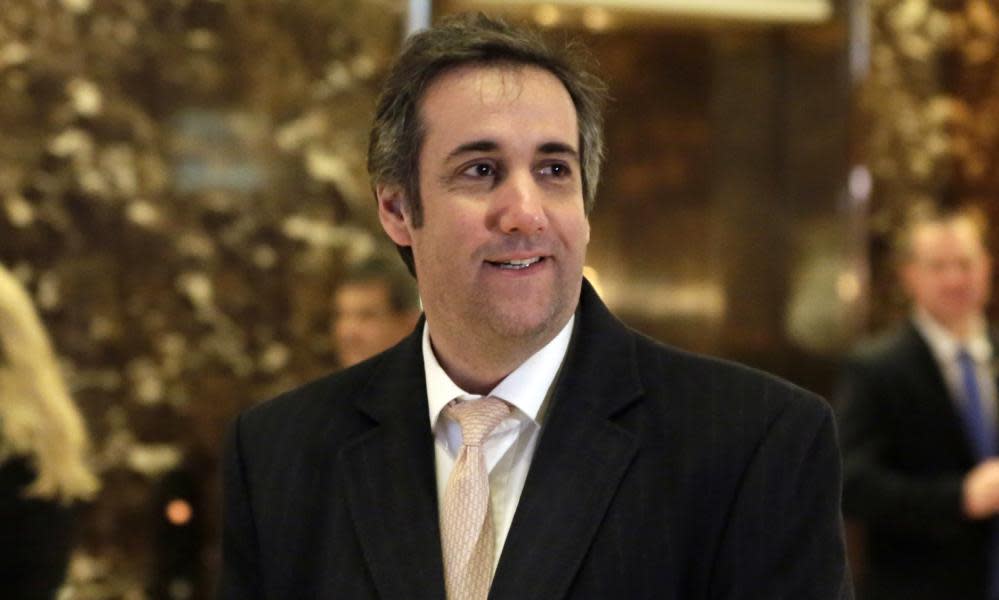Russia dossier: Trump lawyer sues BuzzFeed for publishing document

Donald Trump’s personal lawyer is suing news website BuzzFeed almost exactly a year after it published an explosive dossier containing serious and salacious allegations about collusion with Russia.
Michael Cohen posted on Twitter on Tuesday night: “Enough is enough of the #fake #RussianDossier. Just filed a defamation action against @BuzzFeedNews for publishing the lie filled document on @POTUS @realDonaldTrump and me!”
Cohen told Bloomberg News he had also filed a second defamation suit against political intelligence firm Fusion GPS, which compiled the dossier, in federal court.
Cohen is one of Trump’s closest business advisers and most loyal confidantes and it seems improbable that he was acting without the president’s blessing. His move came hours after Dianne Feinstein, the top Democrat on the Senate judiciary committee, unilaterally released a transcript of testimony from Fusion GPS founder Glenn Simpson.
BuzzFeed vowed to fight the action in court.
Beyond Mueller
Three separate congressional committees are investigating Russian tampering in the 2016 presidential election and possible collusion between Russia and the Trump campaign: the Senate judiciary and intelligence committees, and the House intelligence committee.
The committees have the power to subpoena witnesses and documents. The list of witnesses to have been interviewed so far is long, and includes Donald Trump Jr and Jared Kushner, as well as lesser figures such as former adviser Carter Page; Glenn Simpson, the co-founder of Fusion GPS, which commissioned the Steele dossier; and Ben Rhodes, the former Obama adviser.
Senate intelligence committee
The most aggressive of the three committees so far, with a reasonable appearance of bipartisanship. Republican chairman Richard Burr of North Carolina said in October that the question of potential collusion between the Trump campaign and Russian operatives remained open. But Burr has also said the committee was not focused on “criminal acts” but a larger picture. The committee notably heard testimony from James Comey after the former FBI director was fired.
Senate judiciary committee
Hampered early on by partisan disagreement about the scope of its investigation, the committee has interviewed top witnesses including Donald Trump Jr and has taken a particular focus on the firing of James Comey. But the committee has deferred to Mueller in the investigation of Paul Manafort and has interviewed fewer witnesses than others.
House intelligence committee
Riven by partisan conflict, the committee appears to be on track to produce two reports – one from each party. Chairman Devin Nunes recused himself from the inquiry in March after Trump tweeted that Barack Obama had "tapp[ed] my phones" and Nunes, in an apparent attempt to defend the president, revealed that some communications involving Trump aides had been intercepted by US surveillance programs.
The publication of the 35-page dossier in January 2017 triggered a political storm and debate over media ethics. The raw research by former British intelligence officer Christopher Steele suggested the Russian government had both compromised and colluded with Trump during the 2016 presidential election, and included lurid allegations.
Steele also recorded claims that Cohen had held secret meetings with Russian officials in Prague in August 2016, where he allegedly discussed how to pay Kremlin-associated hackers for targeting Hillary Clinton.
Cohen told Bloomberg that he was mentioned in the dossier 15 times. “It will be proven that I had no involvement in this Russian collusion conspiracy,” he said. “My name was included only because of my proximity to the president.”
In an interview with ABC News, he added: “I want to be very clear. I have never been to Prague or the Czech Republic, and I have never engaged with, been paid by, paid for, or communicated with anyone representing the Russian Federation or anyone else to hack anyone or any organisation or disseminate false news reports or interfere in any way with this election.”
The dossier came into the possession of several media organisations but BuzzFeed posted the unredacted documents just 10 days before Trump’s inauguration, with a warning that the contents contained errors and were “unverified and potentially unverifiable”. The decision was attacked by both Trump and some traditional media outlets, claiming it was irresponsible to publish unverified allegations.
Cohen’s complaint against Buzzfeed names editor-in-chief Ben Smith, reporter Ken Bensinger and editors Miriam Elder and Mark Schoofs.
BuzzFeed said it was ready to defend the case in court. Spokesman Matt Mittenthal said: “The dossier is, and continues to be, the subject of active investigations by Congress and intelligence agencies. It was presented to two successive presidents, and has been described in detail by news outlets around the world. Its interest to the public is obvious. We look forward to defending the free press and our First Amendment rights in court.”
In an article in the New York Times on Tuesday, headlined I’m Proud We Published the Trump-Russia Dossier, Smith wrote: “A year of government inquiries and blockbuster journalism has made clear that the dossier is unquestionably real news. That’s a fact that has been tacitly acknowledged even by those who opposed our decision to publish.”
Cohen said the suit against Fusion GPS and Simpson was filed in federal court in the southern district of New York. It reportedly claims that the firm “recklessly placed [the dossier] beyond their control and allowed it to fall into the hands of media devoted to breaking news on the hottest subject of the day: the Trump candidacy”.
Fusion’s lawyer, Joshua Levy, told Bloomberg he had not seen the suit and had “not received a letter from counsel on anything”.
Cohen has emerged as a person of interest to congressional investigators examining Russian meddling in the 2016 election. He testified to the House intelligence committee behind closed doors on 24 October and publicly to the Senate intelligence committee on 25 October.

 Yahoo News
Yahoo News 
